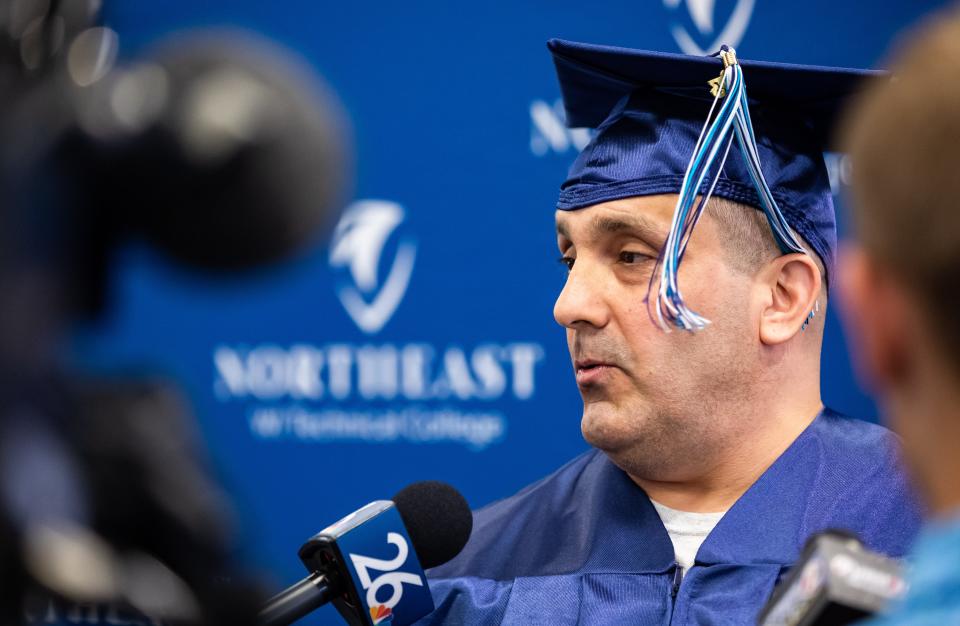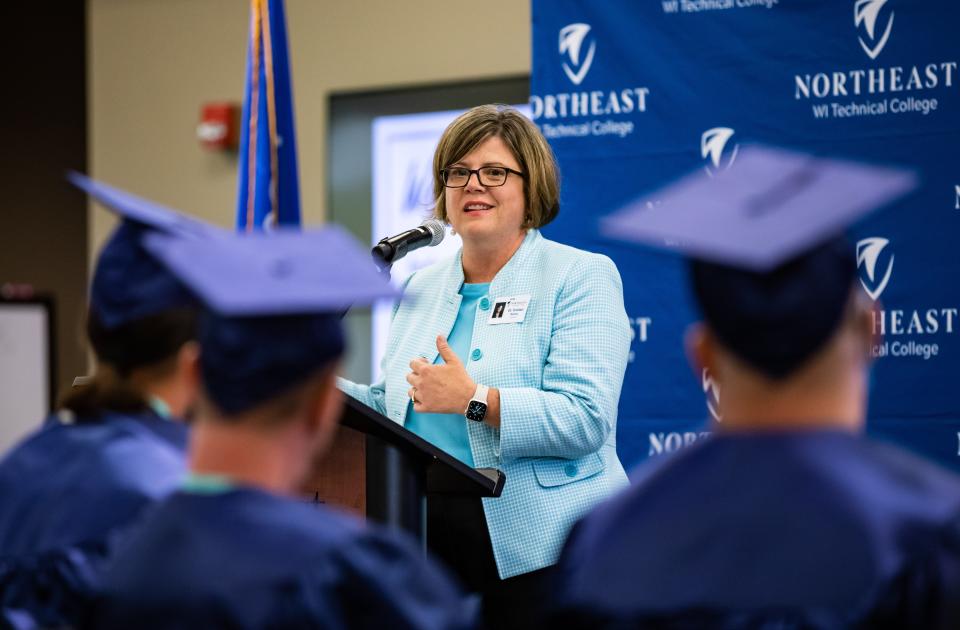These students completed NWTC industrial maintenance certificate as they plan for life after prison
GREEN BAY – With "Pomp and Circumstance" playing over a speaker, 11 men donning caps and gowns walked down an aisle of seats in a conference room at Northeast Wisconsin Technical College in Green Bay Thursday afternoon, in a celebration of successfully completing a summer course to receive a certificate in industrial maintenance.
It was an intensive program, with students completing 15 credits in 15 weeks. After long days of learning about electricity, mechanics, workplace safety and more, the students didn't go back to their houses, families or jobs, but to prison.
The 15-week Industrial Maintenance Certificate program for incarcerated students is a collaboration between NWTC and the Wisconsin Department of Justice. Each summer for the past four years, a cohort of around a dozen inmates at Sanger B. Powers Correctional Center, a minimum-security all-male prison in Oneida, have been accepted as students in the program.
The certificate can provide students with experience to get an entry-level job in the industrial maintenance industry, or it can be a starting point for students to continue their education. All credits directly transfer at NWTC toward an associate degree in Automation Engineering Technology, Electro Mechanical Technology or Electrical Engineering Technology.
For the 44 students who have now graduated from the program, it offers resources and a plan for life post-release.
“When I look back at plans that I’ve made in my life, I’ve come to realize that most of the plans were always made pretty much around what not to do — who not to go back and hang around with, what lifestyles not to go back to, what industries not to go back to. There was never what to do in those plans," said Elias Maldonado, one of the graduating students who spoke at the ceremony. "This program has given me a clear, definitive path out of my past. And more importantly, an exact starting point from here."

Maldonado is three years into a five-year prison sentence for multiple drunken driving convictions. He said after release, he plans to get a job working in a factory somewhere, while returning to school to study the industrial maintenance management.
Maldonado's former career as a chef in the hospitality industry helped fuel an alcohol addiction, he said, with a cycle of long workdays followed by nights at the bar and little sleep. He knew he needed to make a major change in his life after his release.
Despite having no background in any of the coursework, Maldonado embarked on the 15-week program. It wasn't easy, but he attributed his success to the support of his instructors and the other 10 men studying alongside him, some of whom had previously worked jobs in areas like construction, foundry work and biomechanics.
"The cumulative knowledge that these guys have is incredible," Maldonado said in his graduation speech. "No matter what it was that I was struggling with, these guys helped me."

Molly Delsart, an electromechanical engineering instructor at NWTC who taught three of the 15 courses the students took, said this was the most collaborative cohort she's seen during the last four years of the program.
"They banded together. They even worked together at night, when they really weren’t on the class time. And they made sure that everyone understood the material and was successful," Delsart said. "It was very apparent from one day when they left to when they came the next day, they had put in a lot of work. It was very cool.”
Shane Eichhorn, another graduating student who spoke at the ceremony, said taking part in the program to learn skills that will help him find employment after his release was "the best choice (he) ever made."
“The thing that impressed me the most throughout this entire experience is this: in prison especially, but also it seems more and more the norm in society is the unwritten rule, 'look out for yourself and forget everyone else.' Well these guys here, they’re the exception to that rule," Eichhorn said. "Each and every one of them came together and helped each other out without question."
The program is advertised to inmates at various correctional centers across the state, DOC Reentry Employment Program Manager Becky Heth said. Some members of the cohort were transferred to Sanger B. Powers Correctional Center from a different prison specifically so they could get their Industrial Maintenance Certificate.

The Industrial Maintenance Certificate program at NWTC in Green Bay is one of nine similar programs offered through partnerships with various correctional centers and educational institutions around the state, Heth said. According to the DOC's website, correctional centers are a minimum-security type of prison that differ from other correctional facilities because they are smaller in size, typically grant inmates more freedom to move around the building and grounds, and travel offsite for education.
DOC Deputy Secretary Jared Hoy said he has seen incarcerated people who are able to go through similar educational programs be determined to succeed.
"This type of opportunity isn't lost on these folks. ... When someone is incarcerated, that loss of freedom is pretty impactful. And when, whoever it is, whether it's the DOC, the state, the technical college system, steps up and says 'we're going to provide this opportunity to you anyway,' the amount of appreciation and then resulting dedication is almost unprecedented," Hoy said. "It's really cool to see that these guys don't take that for granted, the way somebody else might."
The average cumulative grade for the cohort of students was 92.3%, with the highest at 96.7%. Both Maldonado and Eichhorn expressed gratitude for NWTC's instructors for going above and beyond to help each student succeed.
“These people are amazing, I mean, they are incredible," Maldonado said of the instructors. "They taught us with no trepidation, no judgment about where we were from or why we were there. They just taught us."
Contact Kelli Arseneau at 920-213-3721 or karseneau@gannett.com. Follow her on X (formerly Twitter) at @ArseneauKelli.

CONTINUE YOUR SUPPORT: Thanks to our subscribers for making this coverage possible. Be sure to download our app on the App Store or Google Play. Follow us on social media: Facebook | Twitter | Instagram | Newsletters
This article originally appeared on Appleton Post-Crescent: Prisoners complete NTWC summer course in industrial maintenance

